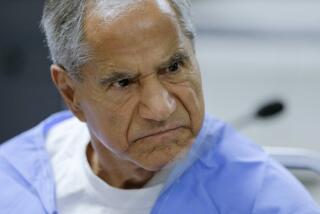Diplomat Slaying Case Is Reopened
- Share via
Los Angeles County Dist. Atty. Steve Cooley said Friday he will retry part of a 19-year-old case against an Armenian man convicted of assassinating a Turkish consul general to block any possibility of parole.
Cooley’s action was prompted by a federal appeals court decision last year that makes the killer, who was sentenced to life in prison, eligible for parole.
Cooley said 38-year-old Harry Sassounian must now defend himself against charges that the Turkish nationality of Consul General Kemal Arikan motivated him to kill the official in 1982 out of revenge for a massacre of Armenians by Turks in the early 1900s.
A jury’s finding that Arikan’s nationality motivated Sassounian was the sole reason, known as a “special circumstance,” that jurors used to recommend life imprisonment without parole. Absent that special-circumstance finding, Sassounian would now be eligible for parole.
The appeals court ruling last year nullified that special circumstance because of juror misconduct. Sassounian may seek parole unless prosecutors can persuade another jury to make the same finding.
Saying he was sympathetic with Armenians’ anger over Turkish “genocide,” Cooley said that doesn’t justify retaliatory terrorism. “Terrorism by members of one nationality or ethnic group against members of another cannot prevail in a free society,” he said.
Cooley’s action, announced Friday in Superior Court, sparked charges by defense attorney Mark Geragos that an “outraged” Armenian community believes Cooley is “exploiting the public’s rightful hysteria and concern over terrorism.” He complained that prosecutors did not decide to retry the penalty part of the case until after the Sept. 11 terrorist attacks on the East Coast.
“The idea of using an Armenian’s case to facilitate a [district attorney’s] political act is unconscionable,” Geragos said.
“I don’t think that there’s any way in this milieu that anybody can get a fair trial based upon the accusations,” Geragos said, “and specifically the fact that they’re going to go forward on the fact that this was a killing done on the basis of national origin.”
Sandi Gibbons, Cooley’s spokeswoman, rejected the allegation, saying the district attorney’s only motivation is to prevent Sassounian from becoming eligible for parole.
“We believe Mr. Sassounian should spend the rest of his life in prison,” Gibbons said. “That’s the only issue here.”
Deputy Dist. Atty. Gregory Dohi, the prosecutor in charge of the retrial, said investigating a 19-year-old case and finding the witnesses was difficult and time-consuming.
Coming at a time when the U.S. military is mobilizing to combat terrorism, the case dredges up decades of history surrounding an assassination campaign against Turkish officials in retaliation for the massacre of more than 1 million Armenians from 1915 to 1918 in their historic homeland of eastern Turkey. Since 1975, Armenian terrorists have assassinated a number of Turkish diplomats.
Prosecutors argued that Sassounian, then 19, assassinated Arikan as part of that campaign. He was convicted of shooting the consul general at a traffic signal as he drove to work in Westwood in 1982.
Arikan’s Turkish origin was just one of two special circumstances that prosecutors used in trying to persuade the jury to recommend the death penalty. They also said the killing was an ambush, known in legal jargon as “lying in wait.” In finding him guilty of murder, the jury rejected the ambush allegation but accepted the national origin motivation as a special circumstance.
The U.S. 9th Circuit Court of Appeals, however, overturned the special-circumstance finding because it said several jurors inappropriately considered evidence they overheard during a private sidebar conference between the judge and the opposing lawyer.
Dohi said the new trial will focus only on both special circumstances because it is not necessary to win a murder conviction again.
More to Read
Sign up for Essential California
The most important California stories and recommendations in your inbox every morning.
You may occasionally receive promotional content from the Los Angeles Times.










